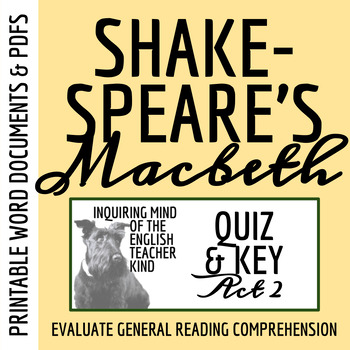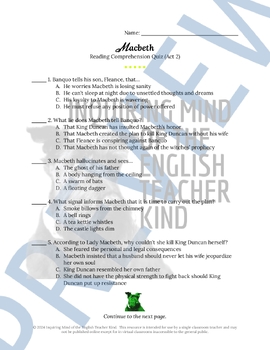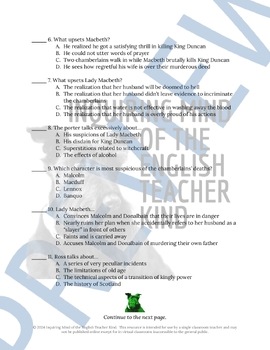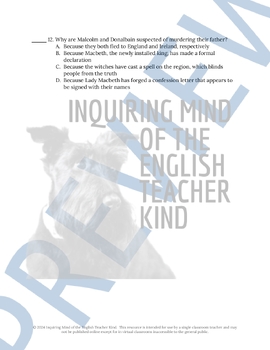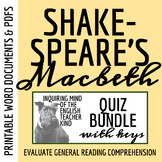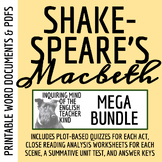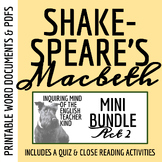Shakespeare's Macbeth Act 2 Quiz and Answer Key for High School
Inquiring Mind of the English Teacher Kind
1.2k Followers
Grade Levels
9th - 12th, Homeschool
Subjects
Resource Type
Standards
CCSSRL.9-10.1
CCSSRL.9-10.10
CCSSRL.11-12.1
CCSSRL.11-12.10
CCSSCCRA.R.1
Formats Included
- Zip
- Easel Assessment
Pages
6 pages
Inquiring Mind of the English Teacher Kind
1.2k Followers
Easel Assessment Included
This resource includes a self-grading quiz students can complete on any device. Easel by TPT is free to use! Learn more.
Also included in
- Evaluate general reading comprehension and eliminate assessment planning responsibilities with this bundle of plot-based quizzes covering each act of William Shakespeare's Macbeth. The assessments may double as guided reading worksheets to facilitate active engagement with Shakespearean drama. AnswePrice $8.50Original Price $10.00Save $1.50
- This low-prep bundle covering Macbeth by William Shakespeare contains all the formative and summative assessments teachers need to assess general reading comprehension, support the development of close reading analysis skills, and greatly reduce take-home grading responsibilities. Included are fivePrice $63.70Original Price $99.00Save $35.30
- Evaluate general reading comprehension and support the development of critical thinking and craft analysis skills with this bundle of formative assessments covering Act 2 of William Shakespeare's Macbeth. A plot-based quiz, four close reading worksheets (one per scene), a vocabulary application actiPrice $15.30Original Price $18.00Save $2.70
Description
Evaluate general reading comprehension and eliminate assessment planning responsibilities with this plot-based quiz covering Act 2 of William Shakespeare's Macbeth. The assessment may double as a guided reading worksheet to facilitate active engagement with Shakespearean drama. An answer key is included. Materials are delivered in editable Word Document and printable PDF formats. (Alternatively, a self-grading Google Drive option is available.)
Students will demonstrate knowledge of the following:
- Banquo's psychological state
- Macbeth's deception of Banquo
- Macbeth's hallucination
- Details regarding the plot to kill King Duncan
- Lady Macbeth's reason for not being able to kill King Duncan herself
- Macbeth's inability to utter words of prayer
- Lady Macbeth's frustration with her husband
- The porter's thoughts on the effects of alcohol
- Macduff's suspicions
- Lady Macbeth's fainting spell
- The peculiar events following King Duncan's death
- The reason Malcolm and Donalbain are suspected of killing their father
Materials are available for teaching a variety of Shakespeare's plays:
- Hamlet - Google and printable
- Julius Caesar - Google and printable
- King Lear - Google and printable
- Macbeth - Google and printable
- Othello - Google and printable
- Romeo and Juliet - Google and printable
- The Merchant of Venice - Google and printable
- The Taming of the Shrew - Google and printable
- The Tempest - Google and printable
Total Pages
6 pages
Answer Key
Included
Teaching Duration
N/A
Report this resource to TPT
Reported resources will be reviewed by our team. Report this resource to let us know if this resource violates TPT’s content guidelines.
Standards
to see state-specific standards (only available in the US).
CCSSRL.9-10.1
Cite strong and thorough textual evidence to support analysis of what the text says explicitly as well as inferences drawn from the text.
CCSSRL.9-10.10
By the end of grade 9, read and comprehend literature, including stories, dramas, and poems, in the grades 9-10 text complexity band proficiently, with scaffolding as needed at the high end of the range.By the end of grade 10, read and comprehend literature, including stories, dramas, and poems, at the high end of the grades 9-10 text complexity band independently and proficiently.
CCSSRL.11-12.1
Cite strong and thorough textual evidence to support analysis of what the text says explicitly as well as inferences drawn from the text, including determining where the text leaves matters uncertain.
CCSSRL.11-12.10
By the end of grade 11, read and comprehend literature, including stories, dramas, and poems, in the grades 11-CCR text complexity band proficiently, with scaffolding as needed at the high end of the range.By the end of grade 12, read and comprehend literature, including stories, dramas, and poems, at the high end of the grades 11-CCR text complexity band independently and proficiently.
CCSSCCRA.R.1
Read closely to determine what the text says explicitly and to make logical inferences from it; cite specific textual evidence when writing or speaking to support conclusions drawn from the text.

